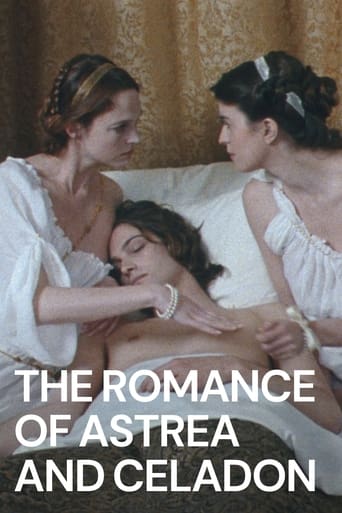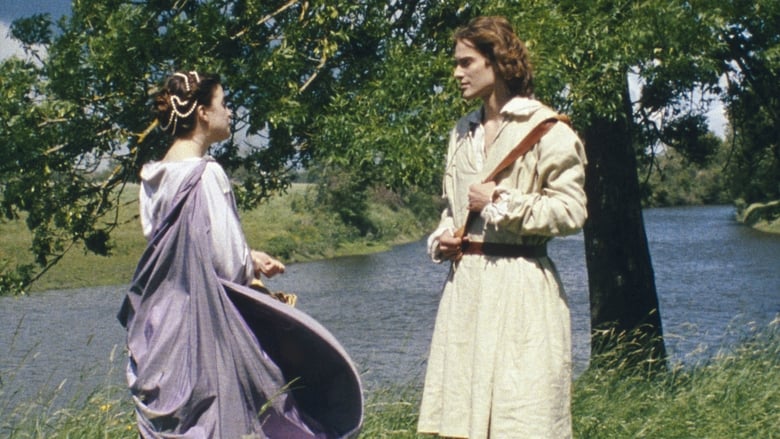The Romance of Astrea and Celadon (2007)
In an enchanted forest, back in the time of the Druids, the shepherd Céladon and the shepherdess Astrée share a pure and chaste love. Fooled by a suitor, Astrée dismisses Céladon, who throws himself into a river out of despair. She thinks he's dead, but he's been secretly rescued by some nymphs. Faithful to the promise he made to Astrée to never appear before her again, Céladon must overcome many obstacles to break the curse. Mad with love and despair, coveted by the nymphs, surrounded by rivals, and obliged to disguise himself as a woman to be near the one he loves, will he manage to make himself known without breaking his oath? A romance filled with doubt, hazards, and delicious temptations.
Watch Trailer
Cast
Reviews
Such a frustrating disappointment
From my favorite movies..
The joyful confection is coated in a sparkly gloss, bright enough to gleam from the darkest, most cynical corners.
This is a small, humorous movie in some ways, but it has a huge heart. What a nice experience.
French film "Les Amours D'Astrée Et De Céladon" is absolutely Rohmerian in essence but still relatively easy to follow.It is probably one of the simplest films made by French new wave master Eric Rohmer.Apart from entertaining die hard art cinema admirers,this is a film which would be of great use to students of French language and literature as it makes effective use of simple French language for its lively dialogs full of charm and wit.Eric Rohmer has also created a marvelous feast for eyes as the portrayal of ancient times is artistic,innovative and remarkably honest.One has to appreciate that Rohmer's choice of young actors is brilliant especially Andy Gillet and Stéphanie Crayencour who add an endearing touch to their magnanimous depiction of truthful lovers Céladon and Astrée.Although there is no hint of any kind of inherent eroticism,those who can read between the lines can decipher that this ancient love story is erotic purely out of its own accord. Les amours d'Astrée et de Céladon/The loves of Astrée and of Celadon is a true love story which must be seen by anyone who has ever fallen in love.
Raymond Radiguet concluded his novel "Count d' Orgel's Ball" in a masterly manner with the count's terrible phrase: And now, sleep, Mahaut, I want it so - mesmerizing his love into blackmail.What this has to do with Rohmer's pastoral romance? Its histrionics could not be more far than Rohmer's world. I take it as a perfect contrast to the film's end: young Astree cheerfully chirps to the exposed, from his previous cross-dressed role as a druid's sick daughter, Celadon: Vives! Vives! Je te le commande! which translates into something like: Live! Live! I order you so! This "into something like" has its own whimsical twist that makes me wonder about the extent of Rohmer's deliberate irony (and mine): Astree, or rather the actress portraying her, seems to me the more naive of the whole cast, and the more debatable on technical skills. I mean the troubadour, or rather a mockery of this, with his shrill voice, does not offend me as over-the-top in his performance, although he is a bit obvious. He is there for, in a way, us throwing darts to him. Perhaps Rohmer's mockery turned a bit harsh on him; one wonders if this was the case for Astree. It makes me think of Kubrick's sly choices of leading men in his films: the actors' public image as exemplary cases of somewhat ridiculous virility, in Kubrick's hands turned into the films' advantage.Of course this sadistic strain does not occur in Rohmer, far from it. So, why do I mention this? Here comes the punchline: because Astree's articulation is so blurred, her acting so bad and fresh, that the first time I heard the film's final sentence I thought, astonished and confused, that she was saying "Je telecommande!" that is, literally, "I TV order".Was this Rohmer's last word? For even if I cannot argue that wordplay is something he pursued in his films (although the early short "The Monceau bakery girl" features the amorous homonymy "ca me dit/samedi" in the flirting exchange "Ca vous dit?" "Oui, ca me dit." "Sortons donc Samedi." which means "It sounds okay?" "Yes, it sounds okay." "So let's go out on Saturday."), I cannot claim either that this was something he overlooked. The film in its simplicity, exemplifies an amazing level of sophistication. For to achieve such illusory simplicity, that also dares to play with our allusions of a soft-porn sensibility, or mock-philosophy (listen how the druid's discourse on trinity has the volume turned down a little, as a soft pedal occurred), well, it warrants a master's touch.I am left amused, or rather bemused, than perplexed. It is as if this doesn't actually matter, and one wouldn't want it otherwise, mesmerized away from TV, into somewhat more difficult pleasures posing as, and with pastoral simplicity; it all is spiritually uplifting.I will soon revisit - and live! - this little quick-silvery film.
I saw you kiss her. Get out of my sight. I shall kill myself. Come back! How shallow can two people be? This is basically the opening of this film, which is beautiful in it's setting, but weak in story.Enter some nymphs to rescue him. Nymphs? The chief nymph Galathée (Véronique Reymond) wants to keep him for herself. Meanwhile Astrée (Stéphanie Crayencour) is wallowing in self pity, believing Céladon (Andy Gillet) dead.The nymph Léonide (Cécile Cassel) dresses Céladon as a girl to sneak away. But efforts to get him to return to Astrée prove futile until a Druid convinces him to dress as a girl and be near her. She discovers his ruse after they engage in passionate kissing. A closeted lesbian perhaps? It was a gorgeous film, as I said, but the story was a little silly.
It's been said several times - not least by me - that watching an Eric Rohmer film is like watching paint dry; it seems that Monsieur Rohmer resents this (he doesn't deny it, but then how could he, he just resents it) so much so that his new movie, which may also be his last, Inch Allah, is set so far back in time that it's like watching woad dry. Those wonderful people who gave you the Nouvelle Vague, Cahiers du Cinema have already named it one of the best films of 2007 so that should give you some idea. Reality is not high on Rohmer's agenda so that in 5th Century France we have at one extreme a château that would not be out of place in the Loire valley whilst the only other dwelling we see is a rude wooden hut. The story involves nymphs and shepherds and as he often does Rohmer has cast it with unknowns who just happened to be passing so that the overall effect is that the annual class play at a school for Special Needs pupils was captured on film by accident. One is almost tempted to say 'Come back Godard, all is forgiven' but even this woeful production can't make me utter those words.





